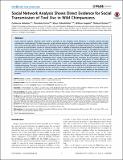Files in this item
Social network analysis shows direct evidence for social transmission of tool use in wild chimpanzees
Item metadata
| dc.contributor.author | Hobaiter, Catherine | |
| dc.contributor.author | Poisot, Timothée | |
| dc.contributor.author | Zuberbuehler, Klaus | |
| dc.contributor.author | Hoppitt, William | |
| dc.contributor.author | Gruber, Thibaud | |
| dc.date.accessioned | 2015-02-03T17:01:02Z | |
| dc.date.available | 2015-02-03T17:01:02Z | |
| dc.date.issued | 2014-09-30 | |
| dc.identifier | 157932121 | |
| dc.identifier | 6666c3a6-1487-4b3e-a719-7a72e1f0a48e | |
| dc.identifier | 000342905400022 | |
| dc.identifier | 84920385394 | |
| dc.identifier | 000342905400022 | |
| dc.identifier.citation | Hobaiter , C , Poisot , T , Zuberbuehler , K , Hoppitt , W & Gruber , T 2014 , ' Social network analysis shows direct evidence for social transmission of tool use in wild chimpanzees ' , PLoS Biology , vol. 12 , no. 9 , e1001960 . https://doi.org/10.1371/journal.pbio.1001960 | en |
| dc.identifier.issn | 1544-9173 | |
| dc.identifier.other | ORCID: /0000-0002-3893-0524/work/46125075 | |
| dc.identifier.other | ORCID: /0000-0001-8378-088X/work/64360733 | |
| dc.identifier.uri | https://hdl.handle.net/10023/6060 | |
| dc.description | The authors are grateful to the Royal Zoological Society of Scotland for providing core funding for the Budongo Conservation Field Station. The fieldwork of CH was funded by the Leverhulme Trust, the Lucie Burgers Stichting, and the British Academy. TP was funded by the Canadian Research Chair in Continental Ecosystem Ecology, and received computational support from the Theoretical Ecosystem Ecology group at UQAR. The research leading to these results has received funding from the People Programme (Marie Curie Actions) and from the European Research Council under the European Union's Seventh Framework Programme (FP7/2007–2013) REA grant agreement n°329197 awarded to TG, ERC grant agreement n° 283871 awarded to KZ. WH was funded by a BBSRC grant (BB/I007997/1). | en |
| dc.description.abstract | Social network analysis methods have made it possible to test whether novel behaviors in animals spread through individual or social learning. To date, however, social network analysis of wild populations has been limited to static models that cannot precisely reflect the dynamics of learning, for instance, the impact of multiple observations across time. Here, we present a novel dynamic version of network analysis that is capable of capturing temporal aspects of acquisition-that is, how successive observations by an individual influence its acquisition of the novel behavior. We apply this model to studying the spread of two novel tool-use variants, "moss-sponging'' and "leaf-sponge re-use,'' in the Sonso chimpanzee community of Budongo Forest, Uganda. Chimpanzees are widely considered the most "cultural'' of all animal species, with 39 behaviors suspected as socially acquired, most of them in the domain of tool-use. The cultural hypothesis is supported by experimental data from captive chimpanzees and a range of observational data. However, for wild groups, there is still no direct experimental evidence for social learning, nor has there been any direct observation of social diffusion of behavioral innovations. Here, we tested both a static and a dynamic network model and found strong evidence that diffusion patterns of moss-sponging, but not leaf-sponge re-use, were significantly better explained by social than individual learning. The most conservative estimate of social transmission accounted for 85% of observed events, with an estimated 15-fold increase in learning rate for each time a novice observed an informed individual moss-sponging. We conclude that group-specific behavioral variants in wild chimpanzees can be socially learned, adding to the evidence that this prerequisite for culture originated in a common ancestor of great apes and humans, long before the advent of modern humans. | |
| dc.format.extent | 12 | |
| dc.format.extent | 995413 | |
| dc.language.iso | eng | |
| dc.relation.ispartof | PLoS Biology | en |
| dc.subject | Pan-troglodytes | en |
| dc.subject | Cultural transmission | en |
| dc.subject | Foraging techniques | en |
| dc.subject | Cumulative culture | en |
| dc.subject | Diffusion dynamics | en |
| dc.subject | Behavior | en |
| dc.subject | Communities | en |
| dc.subject | Evolution | en |
| dc.subject | Monkeys | en |
| dc.subject | Conformity | en |
| dc.subject | BF Psychology | en |
| dc.subject | QL Zoology | en |
| dc.subject | BDC | en |
| dc.subject | R2C | en |
| dc.subject.lcc | BF | en |
| dc.subject.lcc | QL | en |
| dc.title | Social network analysis shows direct evidence for social transmission of tool use in wild chimpanzees | en |
| dc.type | Journal article | en |
| dc.contributor.sponsor | BBSRC | en |
| dc.contributor.institution | University of St Andrews. School of Psychology and Neuroscience | en |
| dc.contributor.institution | University of St Andrews. Institute of Behavioural and Neural Sciences | en |
| dc.contributor.institution | University of St Andrews. Centre for Social Learning & Cognitive Evolution | en |
| dc.contributor.institution | University of St Andrews. School of Biology | en |
| dc.identifier.doi | 10.1371/journal.pbio.1001960 | |
| dc.description.status | Peer reviewed | en |
| dc.identifier.url | https://journals.plos.org/plosbiology/article?id=10.1371/journal.pbio.1001960#s5 | en |
| dc.identifier.grantnumber | BB/I007997/1 | en |
This item appears in the following Collection(s)
Items in the St Andrews Research Repository are protected by copyright, with all rights reserved, unless otherwise indicated.

